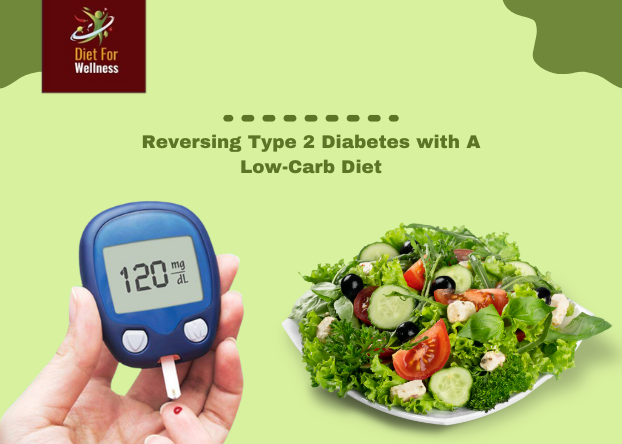Reversing Type 2 Diabetes with A Low-Carb Diet

Living with type 2 diabetes requires careful management, and diet plays an important role alongside medication. While you’re likely aware of the need to adjust your food intake to control blood sugar, a new study suggests that diet may be even more impactful than previously believed.
Published in the journal BMJ Nutrition, Prevention & Health, a research found that a low-carbohydrate diet effectively managed blood sugar levels in individuals with type 2 diabetes. Remarkably, over half of the participants who embraced this dietary approach achieved remission and were able to discontinue their diabetes medications.
A recent study conducted in a primary care setting observed that approximately 97% of type 2 diabetes patients who adhered to a low-carbohydrate diet experienced significant improvements in blood sugar control. Furthermore, 51% of these individuals achieved diabetes remission, with those recently diagnosed with the condition exhibiting a higher likelihood of remission compared to those with longer-term diabetes.
Dr. Anoop Misra, head of the Fortis-CDOC diabetes center in New Delhi, emphasizes that reducing carbohydrate consumption in the Indian diet to under 40 percent can lead to remission in newly diagnosed diabetes.
Research has demonstrated that weight loss achieved through calorie restriction can induce remission in type 2 diabetes, characterized by the normalization of blood sugar levels without the need for medication.
Type 2 Diabetes Remission
Type 2 diabetes occurs when the body loses its ability to effectively utilize insulin, leading to elevated blood sugar levels. This is reflected in high blood glucose levels and elevated glycated hemoglobin (HbA1c) levels, which provide an average blood sugar reading over the past 2-3 months.
Traditionally, type 2 diabetes was considered an irreversible, lifelong condition. However, recent research has demonstrated that long-term remission is achievable. Diabetes remission signifies a return to prediabetic HbA1c levels (below 6.5%) and blood glucose levels within the normal range for at least 3 months, without the use of any diabetes medication.
It’s important to understand that remission does not equate to a cure, as blood sugar levels may potentially rise again. While numerous medications exist to manage blood sugar, many individuals still struggle to achieve adequate glycemic control.
Can a Low-Carb Diet Reverse This?
Overweight and obesity are prevalent among individuals with type 2 diabetes, affecting 80-90% of cases. Research has shown that weight loss, achieved through bariatric surgery or calorie restriction, can lead to diabetes remission.
Excessive energy intake contributes to fat accumulation around the liver, impairing the liver’s ability to process glucose and subsequently reducing insulin secretion from pancreatic beta cells. Studies show that reducing energy intake can reverse type 2 diabetes by decreasing liver fat and improving beta-cell function.
While a healthy diet is important for diabetes remission, the optimal dietary approach remains a subject of debate. One such approach is a low-carbohydrate diet, which restricts the intake of sugary foods and carbohydrates like bread, rice, and potatoes, while emphasizing the consumption of green leafy vegetables, fish, meat, nuts, and fruits.
Evidence suggests that a low-carb diet can induce short-term remission in type 2 diabetes by improving beta-cell function, reducing fat accumulation, and promoting sustained weight loss through reduced hunger and increased energy expenditure. Maintaining weight loss is a significant challenge for people with diabetes, making this aspect particularly important.
However, some studies have questioned the impact of carbohydrate intake on blood glucose control in type 2 diabetes. Furthermore, long-term adherence to a low-carb diet can be challenging for many individuals.
Is a Low-Carb Diet Right for You?
Every individual is unique, and your healthcare team is best equipped to guide you in determining if a low-carb diet is suitable for your specific needs, particularly if you’re aiming for type 2 diabetes remission.
Most importantly, if you’re currently on insulin or other diabetes medications, such as sulfonylureas, it’s essential to consult your doctor before starting a low-carb diet. This is because carbohydrate intake significantly influences blood sugar levels. Reducing carbohydrate consumption without adjusting your medication can increase the risk of hypoglycemia (low blood sugar).
Your healthcare team can provide personalized advice on necessary medication adjustments to ensure your safety while following a low-carb diet.
One potential advantage of a low-carb diet is its relative ease of integration into social settings. If social compatibility is a priority for you, a low-carb approach might be worth considering.
How Can a Low-Carb Diet Reverse Type 2 Diabetes?
A low-carb diet can help put type 2 diabetes into remission by
- Switching to fat for fuel– The body is encouraged to utilize stored fat for energy by reducing sugar intake.
- Improving insulin sensitivity– This dietary approach can help cells become more responsive to insulin, a key hormone for regulating blood sugar.
Where to Find More Information
Consult your healthcare team before significantly reducing carbohydrate intake. They can provide personalized guidance based on your individual needs, considering your diabetes, current medications, and any other health conditions.
Also you can explore our low-carb meal plan for inspiration and recipe ideas.
